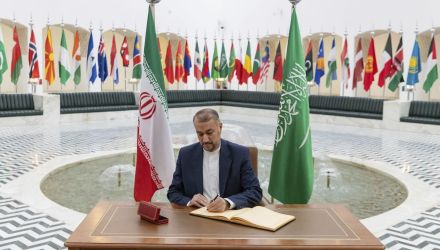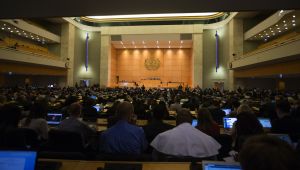Matthew Bunn was a guest on the NewsHour with Jim Lehrer discussing Pakistan's nuclear security.
Watch a video recording of the interview here. The transcript of the interview is below.
GWEN IFILL: Pakistan's political turmoil is about more than internal conflict. It could also be about the future and security of its nuclear arsenal, which has been compromised before.
Here to talk about Pakistan's nuclear issues are Matthew Bunn, who served in the Office of Science and Technology Policy during the Clinton administration. He's now a senior research associate in the Project on Managing the Atom at Harvard University's Kennedy School of Government.
And Zia Mian, he's a physicist and directs the Project on Peace and Security in South Asia at Princeton University. A Pakistani citizen, he has written extensively about nuclear issues.
Welcome to you both.
Zia Mian, give us an idea about the extent to which, to the degree that we know, of Pakistan's nuclear program.
ZIA MIAN, Project on Peace and Security in South Asia, Princeton University: Well, there is naturally a lot of secrecy about Pakistan's nuclear program, like there is about the nuclear programs of most other countries.
But what we do know is that Pakistan has a large number of nuclear facilities that it's developed over the last 30 years, and probably enough nuclear material for several dozen nuclear weapons.
But most of us believe that Pakistan doesn't have those weapons on missiles or on airplanes ready to use, unlike, for example, the nuclear weapons of the United States, which are ready to use in half an hour. Pakistan keeps its weapons disassembled as a way of making sure that they are secure and safe and also because they're afraid that they may be attacked at some stage.
Assessing the immediate risk
GWEN IFILL: Well, given what we know, Matthew Bunn, about the state of those nuclear weapons, who is right in the argument that's been building this week? We've had John Bolton and Richard Holbrooke, the former U.N. ambassadors, saying this is a very serious and risky situation, and we have people, like the former deputy secretary of state, Richard Armitage, saying it's not that immediately difficult. What would you say?
MATTHEW BUNN, Project on Managing the Atom, Harvard University: Well, I think there is a real and ongoing risk of possible theft of a nuclear weapon or nuclear materials in Pakistan, or a leakage of nuclear technology, as we've seen in the past in Pakistan.
But I'm not sure that the current political turmoil has changed that risk very much yet, because it hasn't yet affected the institutional integrity of the military and the security forces, which are the key elements for guarding the nuclear stockpiles.
GWEN IFILL: So what do you think that that means about immediate danger? We're talking about eventual danger rather than immediate?
MATTHEW BUNN: I think there is a real, immediate danger, not because Pakistan's nuclear stockpiles are not well-guarded -- I think they are -- but there are huge threats in Pakistan. It is, after all, al-Qaida's world headquarters, and there are nuclear and military insiders with Islamic extremist sympathies and, in some cases, with a demonstrated record of selling sensitive nuclear technologies around the world, in the case of the A.Q. Khan black market nuclear network.
So while there's a very focused nuclear security system in place, that system has to deal with very big threats.
Safeguarding the nuclear stockpile
GWEN IFILL: Zia Mian, let's talk about the A.Q. Kahn network, which, of course, in 2004, he was the man who was running, was the brains behind Pakistan's nuclear program, and he's being still held on house arrest and accused, or proven, that he has sold national secrets to Libya and Iran and North Korea. How much does his activity prove or disprove the potential threat of a leak of intelligence from Pakistan?
ZIA MIAN: Well, what the A.Q. Kahn situation showed was that, even though the government of Pakistan thought it had control over what was going on in its nuclear facilities, that people who were actually directly responsible for managing those facilities were able to have great autonomy in the kinds of things that they did because the people who worked for them thought that whatever their bosses were doing must be government policy.
Since then, of course, General Musharraf, under pressure from the international community and from people at home, have said that Pakistan has really strengthened its control over its nuclear program, its nuclear facilities, and that there are a whole new set of procedures and rules for making sure that the people who work in those programs do what they're told and don't go off the reservation, that the materials in those facilities are safe and secure.
But, really, the question becomes, how do you trust the people with the access to those materials to stay loyal?
GWEN IFILL: Well, that's what I was going to ask you. How do we know that those greater safeguards have been put in place?
ZIA MIAN: Because they say that they've put them in place, but that's all you can do, because these are their most sensitive secret facilities.
GWEN IFILL: Matthew Bunn, what do you think -- first of all, do you believe that these things have been secured and, more importantly, the leaks of knowledge have been secured? And if not, what could the U.S. or any other nation do about that?
MATTHEW BUNN: Well, I think it's pretty clear that a series of fairly substantial upgrades in security measures, and control measures, and personnel reliability measures have been taken in Pakistan.
There is now this strategic plans division under General Kidwai that is in charge of the nuclear arsenal and the nuclear stockpile, and it has within it a unit of about 1,000 individuals that specifically are focused on security for the nuclear stockpile.
Nonetheless, as I say, I think there are real risks. There are things the United States can do. The United States is now cooperating with Pakistan to help upgrade the security measures at some of these nuclear sites, although, so far, Pakistan has said that it has not allowed any U.S. personnel to actually go and review the security at these sites because they're so sensitive.
Preventing a terrorist threat
GWEN IFILL: If I can follow up with you on that, could the political instability that we are seeing right now in Pakistan be the spark that could turn these risks into something more immediate and dire?
MATTHEW BUNN: I think there are future scenarios that we have to be thinking about. I don't think we're anywhere near there, and I think that they remain unlikely, but we should be taking steps to make them more unlikely.
One scenario is a state failure in Pakistan, where you end up with a failed state with nuclear weapons, and that would greatly increase the risk that terrorists could get their hands on a nuclear bomb or the materials to make one there.
Another scenario is takeover of the government by a Taliban-type regime. I think both of those are unlikely, but I think we need to be working more with Pakistan to build stability there to reduce those risks.
It's important also to understand that this is not just a Pakistan issue. This is a global issue. There are the essential ingredients of nuclear weapons in some 40 countries around the world. And in many of those countries, improved measures for security are urgently needed.
In Pakistan -- in excuse me, South Africa, just a few days ago, there was an armed attack on a facility where there is a large amount of highly enriched uranium, the easiest material in the world for a terrorist to make a nuclear bomb from, and the attackers made it into the control room and shot one of the people in the control room. So this is a very serious issue worldwide.
GWEN IFILL: Well, we have seen in Pakistan, Zia Mian, that at least twice President Musharraf has been the object of assassination attempts, we're told by al-Qaida. Does that mean that Pakistan is more vulnerable to this sort of attack, this sort of terrorist imposition, I suppose, to put it mildly, as we have seen -- as Mr. Bunn has just talked about in South Africa? Is Pakistan also vulnerable to that sort of attack?
ZIA MIAN: Well, the Pakistani army is a very powerful institution. And it's also historically been very loyal to its commanders. And so even if something were to happen to General Musharraf, and people who have held his position in the past have died in explosions unexpectedly, and there has been a smooth transition in power, with the next-highest-ranking general taking over and assuring continuity of command in the military.
So if something were to happen to General Musharraf, that wouldn't be the problem. But I think what Matt Bunn has pointed out is actually the key thing, that it's the future development of Pakistan, rather than the current crisis, that we should be focused on.
Right now, General Musharraf has unleashed his forces against pro-democracy activists, and lawyers, and teachers, and students. They're not the kind of people who want to get their hands on a nuclear weapon. Most of them think that Pakistan shouldn't even have nuclear weapons.
The problem is the Islamic militants in the border areas of Pakistan who are spreading their influence across the country. And General Musharraf and his military regime have failed to confront this problem. But by keeping democracy out of Pakistan, they've actually accelerated the process, both of the state failing and of feeding support for the insurgency.
And so it's not until we can get rid of the military rule in Pakistan and bring in an elected government that everybody feels is their government, that they have a choice over, then you can start to have people feel that it's their country, and they should be loyal to it, rather than be loyal to some pan-Islamic radical agenda.
U.S. response to crisis
GWEN IFILL: Does the U.S. role or non-role in this help or hinder this effort not to start that spark, whether it starts with the pro-democracy activists and then emboldens the terrorists?
ZIA MIAN: The U.S. has played a very bad role so far in this crisis, but it's a role the United States has consistently played with military dictators in Pakistan. And now many people in Pakistan feel that the United States is trying to engineer a solution that it wishes to see, which is for General Musharraf to stay in power some way, even though the constitution of Pakistan and the Supreme Court of Pakistan says he cannot be president.
And so until the United States basically decides that it's on the side of democracy in Pakistan and that democracy is the path for building a government and a society that will actually deal with the insurgents and will decide that it doesn't want nuclear weapons.
GWEN IFILL: Matthew Bunn, do you think that there's a connection between what happens in this immediate political crisis and the U.S. role in it and what happens with those nuclear weapons?
MATTHEW BUNN: Well, I think absolutely there's a connection. We need, as Zia was saying, to make sure that we build stability in Pakistan and we get the Pakistani government refocused on counterterrorism, rather than on having 4,000 officers outside Benazir Bhutto's home.
At the same time, the only thing I would disagree with Zia on about the implications of those assassination attempts -- he's absolutely right about the likelihood of a smooth transition, but what worries me about those attempts is here you had serving officers in the Pakistani military working with al-Qaida to try to kill the Pakistani president.
If they're doing that, how can we be confident that the military officers guarding the nuclear weapons won't also cooperate with al-Qaida? So I think it's not -- it's an indicator of the kind of risk that exists in Pakistan today.
GWEN IFILL: Matthew Bunn, Zia Mian, thank you both very much.
MATTHEW BUNN: Thank you. Pleasure to be here.
"Pakistan's Political Unrest Prompts Questions About Nuclear Arsenal." NewsHour with Jim Lehrer, November 13, 2007.
The full text of this publication is available in the link below.




